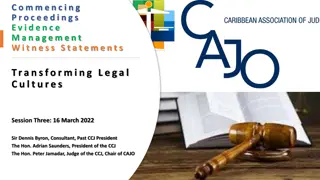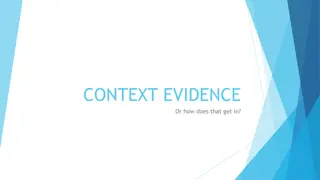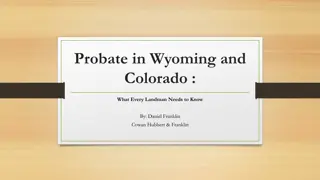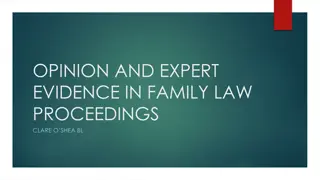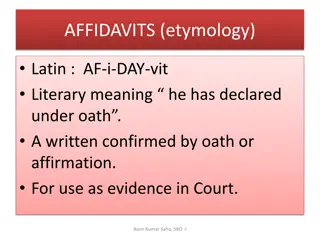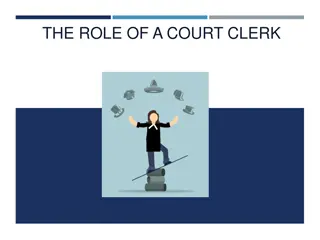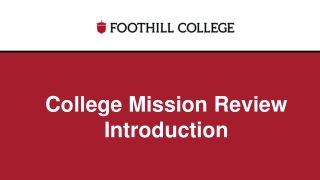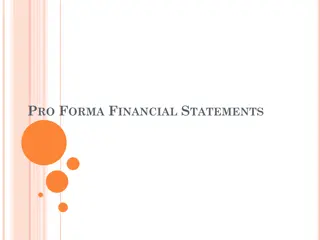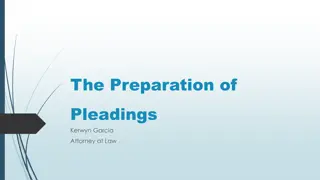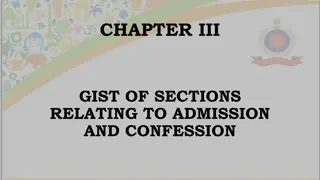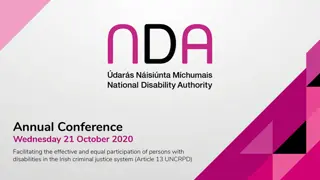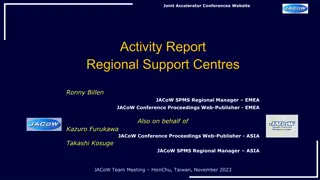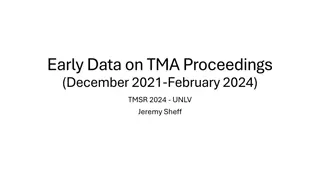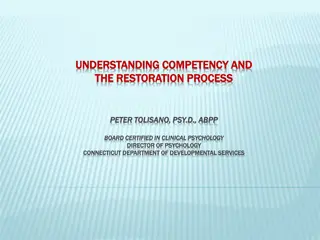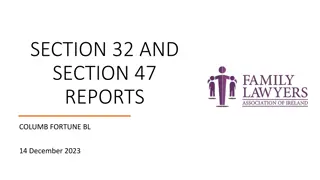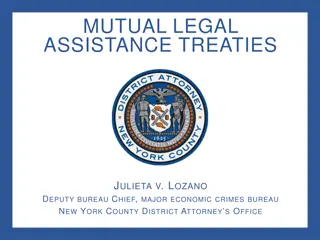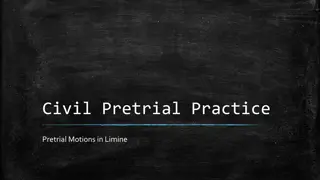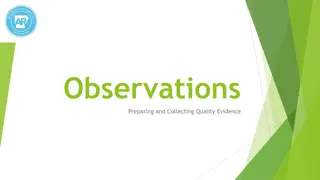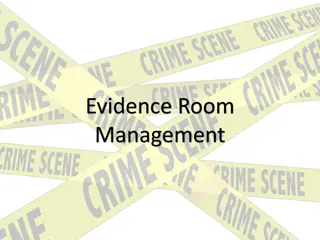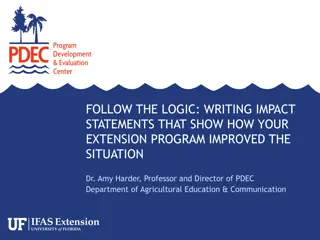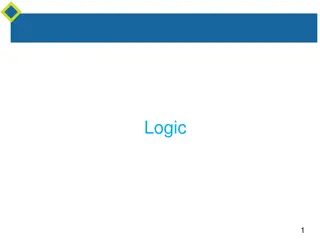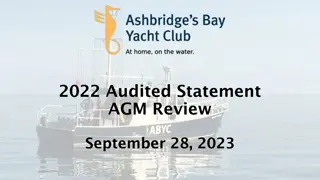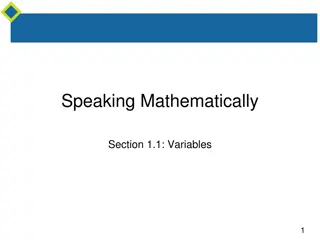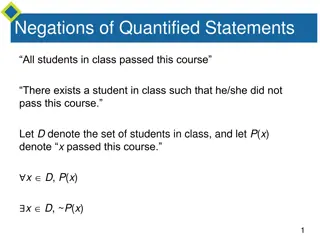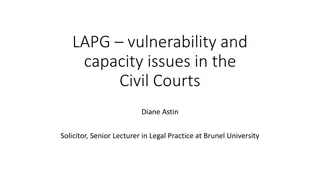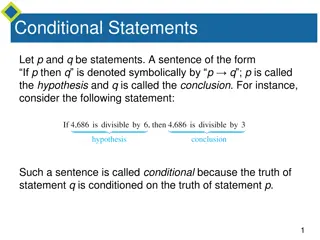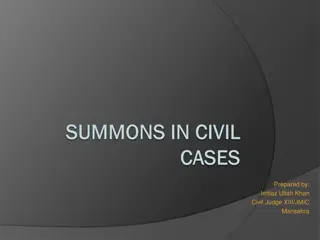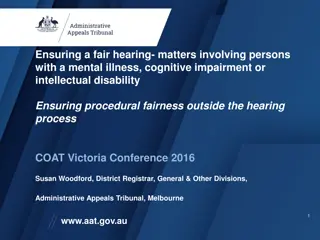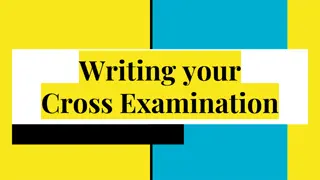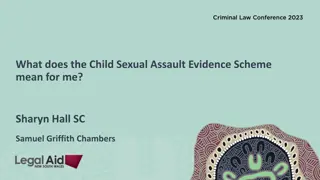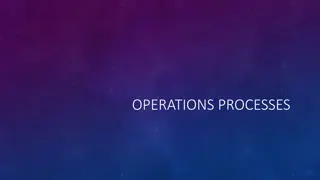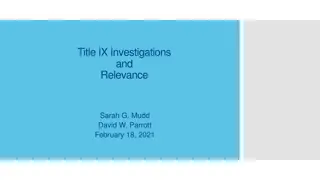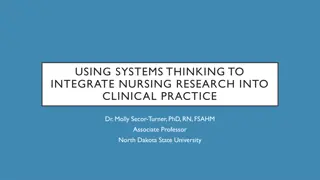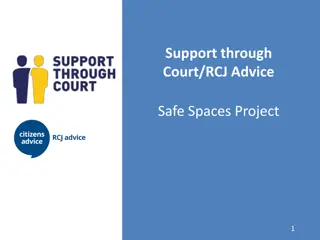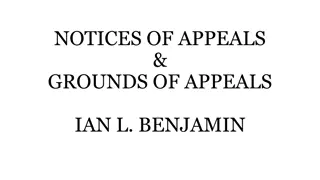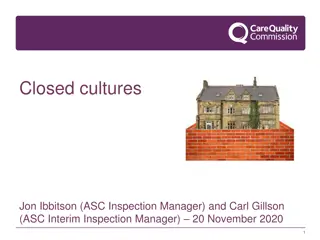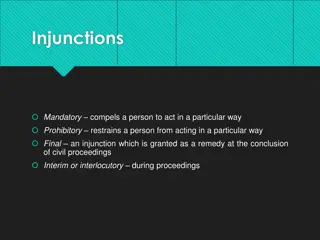Transforming Legal Cultures: Enhancing Legal Proceedings, Evidence Management, and Witness Statements
Expert insights on transforming legal cultures through effective management of legal proceedings, evidence, and witness statements. Join Sir Dennis Byron and The Hon. Adrian Saunders in Session Three on 16 March 2022 for valuable perspectives on this crucial topic.
Download Presentation

Please find below an Image/Link to download the presentation.
The content on the website is provided AS IS for your information and personal use only. It may not be sold, licensed, or shared on other websites without obtaining consent from the author. Download presentation by click this link. If you encounter any issues during the download, it is possible that the publisher has removed the file from their server.
E N D
Presentation Transcript
C o m m e n c i n g P r o c e e d i n g s Ev i d e n c e M a n a g e m e n t W i t n e s s S t a t e m e n t s Transforming Legal Cultures Session Three: 16 March 2022 Sir Dennis Byron, Consultant, Past CCJ President The Hon. Adrian Saunders, President of the CCJ The Hon. Peter Jamadar, Judge of the CCJ, Chair of CAJO
By the end of the session the participants will - a. Relate the commencement of proceedings to: i. the overriding objective, ii. the duty of litigants to assist the court, and iii. the powers of the court in ensuring the just and proportionate disposition of disputes b. Learn about the three methods of commencing proceedings c. Understand the application of measurable performance standards to the management of the commencement of proceedings.
Onus on Litigant for Appropriate Commencement Method 1. Standard Claim Form:[8.1(5)] For resolution of the majority of disputes Fixed Date Claim Form [8.1(6)] For resolution of specified case types with low percentage of contested facts resulting in shorter time to disposition Hire-purchase and credit sales Money lending Possession of land Originating Application Claim Form [8.15/8.16] For resolution of matters not involving substantial dispute of fact or sole purpose of getting approval of settlements involving children and protected party/patient resulting in very short time to disposition. 2. 3.
Fixed Date Claim Forms Court can exercise Case management powers at 1stHearing [27.2(2)]. Court unlikely to strike out if defendant was not misled Hannigan v Hannigan[2000] 2 FCR 650, CA: option to direct modification of form or to give directions for continuation of proceedings. Court can protect other side by adverse order in costs where appropriate Court response to error in commencing proceedings (just and proportionate) Original Application Claim Forms [8.19(1)] Court may with or without application order continue as if Standard Form Claim claim to [8.27] Party may object to use of OA procedure on grounds i) there is substantial question of fact; or ii) procedure is not required or permitted Court has power to give directions for future management of the case
Limitation of Actions and Time for Service [8.2] if limitation period is about to expire and claimant received legal advice for first time with 28 days court may allow Claim to be filed without statement of claim under provisions relating to urgency. [8.14) For the purpose of any enactment relating to limitation periods, an action is brought when it is stamped ( manually or electronically) as received in by or on behalf of the court office see Barnes v St Helens Metropolitan Council [2006] EWCA Civ 1372) Borough [8.13] claimant may apply for extension of period for service: within the period specified by the rule or order of Court: court may grant extension for no more than 6 months on any application, if satisfied that claimant has taken all reasonable steps to serve the form and there is some special reason to extend the form. But the court cannot extend more than once unless satisfied that the defendant is deliberately evading service or there is some other compelling reason [8.12] General rule is that claim form must be served within 6 months of being issued
[8.4] single claim form can include all claims which can conveniently be tried together. Important consideration to avoid future difficulty if claim is brought for matters could have been included. [26.3(1)(c ) Recall power to strike out for abuse of process which includes re-litigation of matters which have already or could have been adjudicated by the Court. See Arthur JS Hall c Simons, et al [2000]3All ER673At 701 per Lod Hoffman: and Hunter v Chief Constable of West Midlands [1982]AC 529 (said to be leading case). Bringing more than one claim in a claim form [8.5] whereas claimant required to make persons jointly entitled to remedy a party to proceedings, failure to add necessary party or adding unnecessary party will not usually result in claim failing.
General Duty to Set out Case [8.6 and 8.7] Claimant must include in claim form or statement of claim all relevant facts on which claimant relies, as short as possible, and identify any document known to claimant which the claimant considers to be necessary to his or her case. If property is being sought to be recovered the claimant must stat estimate of value. Must specify any remedy sought: although court may grant other remedy to which claimant is entitled However, must state claims for aggravated or exemplary damages; interest including basis of entitlement, rate, and period for which claimed; any specified sum of money claimed, identifying the total amount of interest claimed to date of claim and the daily rate at which it will accrue after the date of claim Must state what if any representative capacity Claimant claims or alleges against defendant Must include address for service [3.8] Every statement of case must be verified by a Certificate of Truth
General Duty to Set out Case [8.6 and 8.7] Special Requirements PERSONAL INJURY CLAIMS [8.9] claimant must: State date of birth If evidence of medical practitioner is intended to be relied upon, a copy of a report from the medical practitioner must be attached to claim form ( additional evidence can be called at trial) Schedule of special damages must be included or attached to claim form or statement of claim RELATOR CLAIMS Relator is person on whose behalf a prerogative writ is brought [8.10] authorization/consent of relator must filed before claim is issued
General Duty to Set out Case Pre-Action Communications Pre Action communication can: oPrevent unnecessary litigation oGet settlement oLimit issues oProvide support for the litigation process, e.g. agreement on electronic service etc.
Litigants Duty to Set out Case Claimant must include in claim form or statement of claim all relevant facts on which claimant relies, as short as possible, and identify any document known to claimant which the claimant considers to be necessary to his or her case. If property is being sought to be recovered the claimant must stat estimate of value. Must specify any remedy sought: although court may grant other remedy to which claimant is entitled However, must state claims for aggravated or exemplary damages; interest including basis of entitlement, rate, and period for which claimed; any specified sum of money claimed, identifying the total amount of interest claimed to date of claim and the daily rate at which it will accrue after the date of claim Must state what if any representative capacity Claimant claims or alleges against defendant Must include address for service [3.8] Every statement of case must be verified by a Certificate of Truth
Litigants duty to set out case In PERSONAL INJURY CLAIMS [8.9] claimant must: State date of birth Attach copy of a report from the medical practitioner to claim form (additional evidence can be called at trial) Schedule of special damages must be included or attached to claim form or statement of claim RELATOR CLAIMS - Relator is person on whose behalf a prerogative writ is brought [8.10] authorization/consent of relator must filed before claim is issued
[8.14] CPR requires Claimant to serve with claim form: A defence form appropriate to the case A form of acknowledgment of service: which guides defendant to indicate whether and to what extent there is a dispute about the claim If the claim is for money and application to pay by instalments Information to assist in the return and filing of the documents Claimant s Duty to Defendant
Commencement Requirements Support Overriding Objective Requirement to state facts and identify documentary evidence is key factor in dealing with case justly and proportionately The requirement to specify remedies and supporting material assists to narrow issues and facilitate dispute resolution. Filing consent of relator eliminates unnecessary factual disputes The parties and the court are able to determine what if any issues are in dispute, narrow the issues that are in dispute, and move towards just, expeditious, and proportionate disposition of the case. Service of forms for acknowledgment of service, defence, application for instalment payments is a key to disposing of cases justly and appropriately. Requirement to provide certificate of truth reflects duty of party to be committed to truth and justice
Court may make orders of its own initiative [26.2(2)] Sanctions: Why first filings can be important Court may strike out statement of case not disclosing reasonable ground for bringing action and make adverse order of costs.[26.2(3)] Court may make unless order for noncompliance with any rule for which no sanction has been imposed which could result in striking out if terms not complied with[26.4]. But Court can grant relief from sanctions under specified circumstances [26.8]
A Claimant who failed to specifically plead and strictly prove special damages had award set aside by appeal court: BVIHCVAP2015/0019 Matthews v O Neal. Just and Proportionate Exercise of Power to Sanction (some examples) A Claimant in personal injury claim failed to state date of birth and to attach certificate of truth to claim form, but attached said certificate to statement of claim, considering this and other factors judge dismissed claim to strike out. SLUHCV/2009/0172 Prescott v Parris et al: Regarding power to strike out the 26.3(1) prescription that court may (as opposed to must) strike out implies obligation to consider alternatives including [ 26.1(2)(v)] power to give any other direction to further the overriding objective, and court could order the claimant to supply further details within a further specified period and specify consequences of noncompliance which might include striking out [ rule 26.7(1) 6. There is also the unless order option provided by [26.4(1)]. Bearing in mind the courts power to make orders of its own initiative [26.2] a defendant should not be able to deprive the court of a more proportionate solution where applicable. Real Time Systems Ltd v Renraw Investments et al [2014]UKC 6
[5.1: 5.2: Practice Direction 5] Claim form and statement of claim must be served together unless dispensed with under 8.2: personally, or electronically. There are specific rules for service on specified defendants: attorney of party [5.6]; limited company [5.7]; firm or partnership [5.8]; body corporate [5.9; the crown [65.3]; minors and patients [5.10]; postal service where permitted [5.11] Service within the jurisdiction Pay Attention to Details [5.5] personal service is proved by affidavit of server with adequate proof of identification as set out in rule. [5.12] electronic service is proved by affidavit of person responsible for transmission, with specified exhibits (1&2) or by electronic confirmation of delivery(3).
[5.13 and 5.14] Special power, where there is good reason, to use alternative methods of service, or at an alternative place, permissible in accordance with provisions of these rules and/or order of the court, which may also validate steps already taken to bring the claim form to the attention of the defendant. This could be used to validate alternative service outside of the jurisdiction the court considers that events in the foreign country are capable of constituting proper service. See Abela v Baadarani [2013]UKSC 44 Service within the jurisdiction Pay Attention to Details [15.16] A claim form containing a claim in respect of a contract may be served by any method permitted by that contract [5.17] sets out conditions on which the court may permit a claim form relating to a contract to be served on a defendant s agent. [5.18] permits court to order service of claim form for possession of vacant land by affixing copy to a conspicuous place on the land and by publication in newspaper of general publication.
Counsel should be familiar with the Conventions relating to the service of documents out of the jurisdiction to which Bahamas is party. [7.2 ] There is general power to serve outside the jurisdiction without leave of the Court. This rule lists 18 circumstances where a claim form may be served out of the Bahamas without leave of the court. [7.3 (1 and 2)] identifies the situations where leave of the court is required [7.3 (4 and 5) application must be supported by affidavit: Criteria to be applied by court is whether a) there is real connection with the Bahamas, b) there is serious issue to be tried, c) the Bahamas is the appropriate forum and d) any other relevant circumstance to support as assumption of jurisdiction. [7.4 (1)] if service out of jurisdiction without leave is protested under [9.7] court must dismiss proceeding unless a) there is good arguable case within a para of [7.12] and b )court could assume jurisdiction by reasons set out in [7.3(5) and c) if party had applied for leave it would have been granted d) it is in the interests of justice [7.4 (2)] if service effected with leave and protested court must dismiss proceeding unless party effecting service establishes that in light of evidence now before court the leave was correctly granted Service out of the jurisdiction Pay Attention to Details
[7.4(3)] when service validly effected defendant may apply on ground that Bahamas is not proper forum for stay, or dismissal of proceedings [9.8 or court s inherent jurisdiction] [7.5 7.6A] standard documents for service must be amended to customize them for service out of jurisdiction, e.g. altering time for entering acknowledgement of service [7.7] claim must be served by a method a) specified in part 5, b) permitted by law of country in which it is to be served c) provided for by rules 7.8 and 7.9.; must conform to any convention between Bahamas and county of service; and must be in accordance with law of country of service. Service out of the jurisdiction Pay Attention to Details [7.8] service may be through official channels, - Registrar to submit to Minister of Foreign Affairs for further transmission; and proof of service must be returned in same method. And lays out administrative requirements [7.9] Deals with service under any Convention relating to service of documents. [7.10] time for filing defence or acknowledgement of service is 30 working days from service. [7.11] court has power to order service by alternative methods similar to procedure where the service is to be within the jurisdiction. [7.18]Provides details as to effecting service on a State where court permits service out of jurisdiction.
Documents to be served with claim form a) copy of any order made under 8.2 (regarding urgency) or 13 (extension of time for service). 8.14 (1) when claim is served defendant it must be accompanied by b) defence form c) acknowledgment of service form d) if claim is for money - an application to pay by instalments e)prescribed notes for defendant a) the address of court office to which defendant is to return the forms 8.14(2) there must be inserted on each form b) the reference number of the claim c) the title of the claim 8.14(3) if there is standard defence form appropriate to the particular case set out a practice guide, the form sent to the defendant must be in a standard form of that type.
INSTRUCTIONS TO DEFENDANT TO ACKNOWLEDGE SERVICE Form 1A
APPLICATION FOR PAYMENT BY INSTALLMENTS Form 3
ACKNOWLEDGEMENT OF SERVICE Form 4
DEFENCE AND COUNTERCLAIM Form 5
Originating Application Form To be used when [8.15] court s decision is sought on a question which is unlikely to involve a substantial dispute of fact a statute, rule,of PD requires or permits the use of this procedure [8.16] where there is a claim by or against a child or protected party/patient which has been settled before the commencement of proceedings and the sole purpose of the claim is to obtain the approval of the court. Case Management [8.18 -.19] default judgment not available but on failure to acknowledge service defendant may attend but not take part in hearing without permission of court [8.23 court may on application or its own initiative order/direct matter to continue as standard claim hearing date and other directions for early disposal as soon as defendant has acknowledged service
What Types of Actions? The form must contain (i) the question the claimant wants court to decide, or (ii) the remedy being sought and the legal basis for it, and (iii) any representative capacity of claimant/defendant and a Certificate of truth. Contents of Originating Application Form [8.20] The type of proceedings using this process includes where a person seeks a direction or order from the court such as where a trustee or an executor intending either to bring or to defend a claim, seeks a direction from the court authorizing them so to do. ( Beddoe application after the case of Re Beddoe, Downes v Cottam [1893] 1 Ch 547, CA.)
[8.24] o claimant must file evidence with claim form and have it served on defendant o defendant must file and serve evidence with acknowledgement of service, unless otherwise ordered by court o claimant may file further evidence in reply within 14 days of defendant's evidence o claimant may rely on matters set out in claim form as evidence if the form is verified by Certificate of truth. Evidence Management under Originating Application [8.25] o No evidence is to be relied on unless served in accordance with rules or court gives permission o The Court may require or permit party to give oral evidence or be cross examined o Court may dismiss/strikeout if no evidence is filed with claim or matters set out are not sufficient to support the claim. But court could deal with the matter justly, by giving claimant leave on stringent terms as time for compliance and as to costs (Parnall v Hurst [2003] EWHC 2164 (ch))
Standard Claim Form A Spread Sheet First CMC 84-140 Days after Service of Claim Note that there might be factors known to court office that may have to be taken into account Performance Measure Court statistics should specify Percentage of First CMC to take place within 84-140 days
Fixed Date Claim Form (Maximum Performance Standards) Performance Standards Percentage 1stHearing within ??? Days No Acknowledgment of Service xx% Partial Admission of liability xx% Total Admission of liability Trial at 1stHearing Directions to narrow issues and move towards disposal xx% (maybe the only relevant performance issue on this discussion is date of 1st Hearing, not what happens at it) How to calculate the first hearing date The claim is issued/filed zero day Allow for service Allow for defence 1stHearing Date 14 days 28 days ??? (CMC) xx% xx% NB Power of Court to schedule 1st Hearing to narrow issues and move towards disposal (27.2 (1),(2))
Fixed Date Claim Form (ECSC Experience) Performance Standards Percentage 1stHearing within 42 Days No Acknowledgment of Service xx% Partial Admission of liability xx% Total Admission of liability Trial at 1stHearing Directions to narrow issues and move towards disposal xx% (maybe the only relevant performance issue on this discussion is date of 1st Hearing, not what happens at it) How to calculate the first hearing date The claim is issued/filed zero day Allow for service Allow for defence 1stHearing Date 14 days 28 days 42 days (CMC) xx% xx% NB Power of Court to schedule 1st Hearing to narrow issues and move towards disposal (27.2 (1), (2))
Originating Application (service within Jurisdiction) A Spread Sheet From service to acknowledgement of service and defendant s evidence 14 days (8.22(1)) Zero Date On filing court may fix a hearing date (8.19 (2)) Rules provide that written evidence to be submitted with acknowledgement of service (8.22(1)) onus on court to initiate hearing date (8.19(2)) A first hearing can take place: (a) if no defendant as soon as practicable after filing (b) if there is a defendant as soon as practicable after 14 days of service Performance Measure Percentage of first Hearings within XX days
Questions Comments
By the end of the session the participants will a. Be able to locate evidence management in the context of: (i) the overriding objective, (ii) the court s duty to manage cases, and (iii) the Court s powers under the CPR; b. Learn about: (i) reasons important, evidence management, and (iv) 5 principles that underpin disclosure; 5 overarching goals (ii) 6 evidence management 5 points that why is (iii) underpin a. Be taken through a summary of the rules regarding evidence management and the 2 forms of disclosure under the CPR.
Evidence Management Disclosure & Inspection (Part 28) Evidence (Part 29) 5 OVERARCHING GOALS: o Giving Practical Effect to the Overriding Objective o Effectively and Efficiently Managing Cases o Pro-actively Exploring Possibilities for Settlement o Robust Preparations for Trial o Minimizing Costs and Reducing Delay
Why is Evidence Management Important? 6 Preliminary Reasons: 1. No matter how good or true a case may seem to be, facts need to be established and proved. 2. Admissible and relevant evidence is central to the integrity of the adjudicative process. 3. Judges and all parties have a responsibility to ensure that the best, most cogent, and most credible evidence is received by a court to deal with cases justly.
Why is Evidence Management Important? 4. Evidence management depends on and supports issue identification. Cases are issue driven and the relevance of evidence can only be determined after issues are clearly identified. 5. Effective evidence management prevents surprises, adjournments, delays, and unforeseen and unbudgeted costs. 6. Effective evidence management promotes timeliness, certainty, fairness and just depositions. CAN YOU THINK OF OTHER REASONS?
General Considerations A Case is Determined on Available and Admissible Evidence 5 Key Points: Evidential issues to be Dealt with Justly the Overriding Objective Pro-actively Manage cases in relation to Evidential Matters Use the Courts Powers to Effectively Receive and Use evidence Apply Consequences to directions and orders Explore/Apply the Most Expeditious, Least Costly options EVIDENCE IS CENTRAL TO THE ADJUDICATIVE PROCESS
1.1 The Overriding Objective (1) The overriding objective of these Rules is to enable the court to deal with cases justly and at proportionate cost. (2) Dealing justly with a case includes, so far as is practicable: Part 1.1 (a) ensuring that the parties are on an equal footing; (b) saving expense; Dealing with Cases Justly (c) dealing with the case in ways which are proportionate to (i) the amount of money involved; (ii) the importance of the case; (iii) the complexity of the issues; and (iv) the financial position of each party; (d) ensuring that it is dealt with expeditiously and fairly; (e) allotting to it an appropriate share of the court s resources, while taking into account the need to allot resources to other cases; and (f) enforcing compliance with rules, practice directions and orders.
25.1 Court's duty actively to manage cases The court must further the overriding objective by actively managing cases. This may include - Part 25.1 Duty to Pro- Actively (a) identifying the issues at an early stage; (g) deciding the order in which issues are to be resolved; (j) ensuring that no party gains an unfair advantage by reason of that party s failure to give full disclosure of all relevant facts prior to the trial or the hearing of any application; Manage Cases (k) fixing timetables or otherwise controlling the progress of the case; (l) giving directions to ensure that the trial of the case proceeds quickly and efficiently; and (m) making appropriate use of technology.
26.1 Court's general powers of management (1) The list of powers in this rule is in addition to any powers given to the court by any other rule, practice directions or any enactment Part 26 The Court s Powers (2) Except where these rules provide otherwise, the court may (f) direct that any evidence be given in written form; (k) extend or shorten the time for compliance with any rule, practice direction, order or direction of the court even if the application for an extension is made after the time for compliance has passed; (m) hold a hearing and receive evidence by telephone or use any other method of direct oral communication; (v) take any other step, give any other direction, or make any other order for the purpose of managing the case and furthering the overriding objective,
26.2 Courts power to make orders of its own initiative (1) Except where a rule or other enactment provides otherwise, the court may exercise its powers on an application or of its own initiative. Part 26 The Court s Powers 26.7 The Court's powers in cases of failure to comply with rules, etc. (1) If the court makes an order or gives directions the court must whenever practicable also specify the consequences of failure to comply.
Disclosure & Evidence 5 Key Principles: 1. Disclosure of all documents that are DIRECTLY RELEVANT must be encouraged and compelled at the earliest opportunities. 2. Pre action protocols, identification of documents in pleadings, and early consequential orders for standard disclosure promote just disposition, and the effective and efficient management of both evidence and cases. 3. Standard disclosure should be routinely ordered at the earliest opportunity and generally at the first CMC, or first hearing and be time bound, with specific default consequences applied. 4. There is a duty to disclose all documents and evidence that are directly relevant, and this duty is a continuous one. 5. Serious consequences can result as a consequence of default e.g. non-reliance, striking out.
Part 28 Disclosure General Direct Relevance 28.1 Scope of this Part (1) This Part sets out rules about the disclosure and inspection of documents. (2) In this Part: document means anything on or in which information of any description is recorded whether in writing, electronically or howsoever. (3) A party discloses a document by revealing that the document exists or has existed. (4) For the purposes of this part a document is directly relevant if - (a) the party with control of the document intends to rely on it; (b) it tends to adversely affect that party s case; or (c) it tends to support another party s case, but the rule of law known as the rule in Peruvian Guano * does not apply to make a document "directly relevant". * I desire to give as large an interpretation as I can to the words of the rule a document relating to any matter in question in the action . I think it is obvious from the use of these terms that the documents to be produced are not confined to those, which would be evidence either to prove or disprove any matter in question in the action. It seems to me that every document relates to the matter in question in the action, which would not only be evidence upon any issue, but also which, it is reasonable to suppose, contains information which may-not which must- either directly or indirectly enable the party requiring the affidavit either to advance his own case or to damage the case of his adversary. Brett LJ, Peruvian Guano case, 4 (1882) 11 QBD 55.
Part 28 Disclosure Scope Who Had/Has Control 28.2 Duty of disclosure limited to documents which are or have been in party's control (1) A party's duty to disclose documents is limited to documents which are or have been in the control of that party. (2) For this purpose a party has or has had control of a document if - (a) it is or was in the physical possession of the party; (b) the party has or has had a right to inspect or take copies of it; or (c) the party has or has had a right to possession of it.
Part 28 Disclosure 2 Types Standard & Specific 28.4 Standard disclosure what documents are to be disclosed If a party is required by any direction of the court to give standard disclosure that party must disclose all documents which are directly relevant to the matters in question in the proceedings. 28.5 Specific disclosure (1) An order for specific disclosure is an order that a party must do one or more of the following things (2) An order for specific disclosure may be made on or without an application. (3) An application for specific disclosure is to be made on notice and unless in special circumstances at a case management conference. (5) An order for specific disclosure may require disclosure only of documents which are directly relevant to one or more matters in issue in the proceedings.


